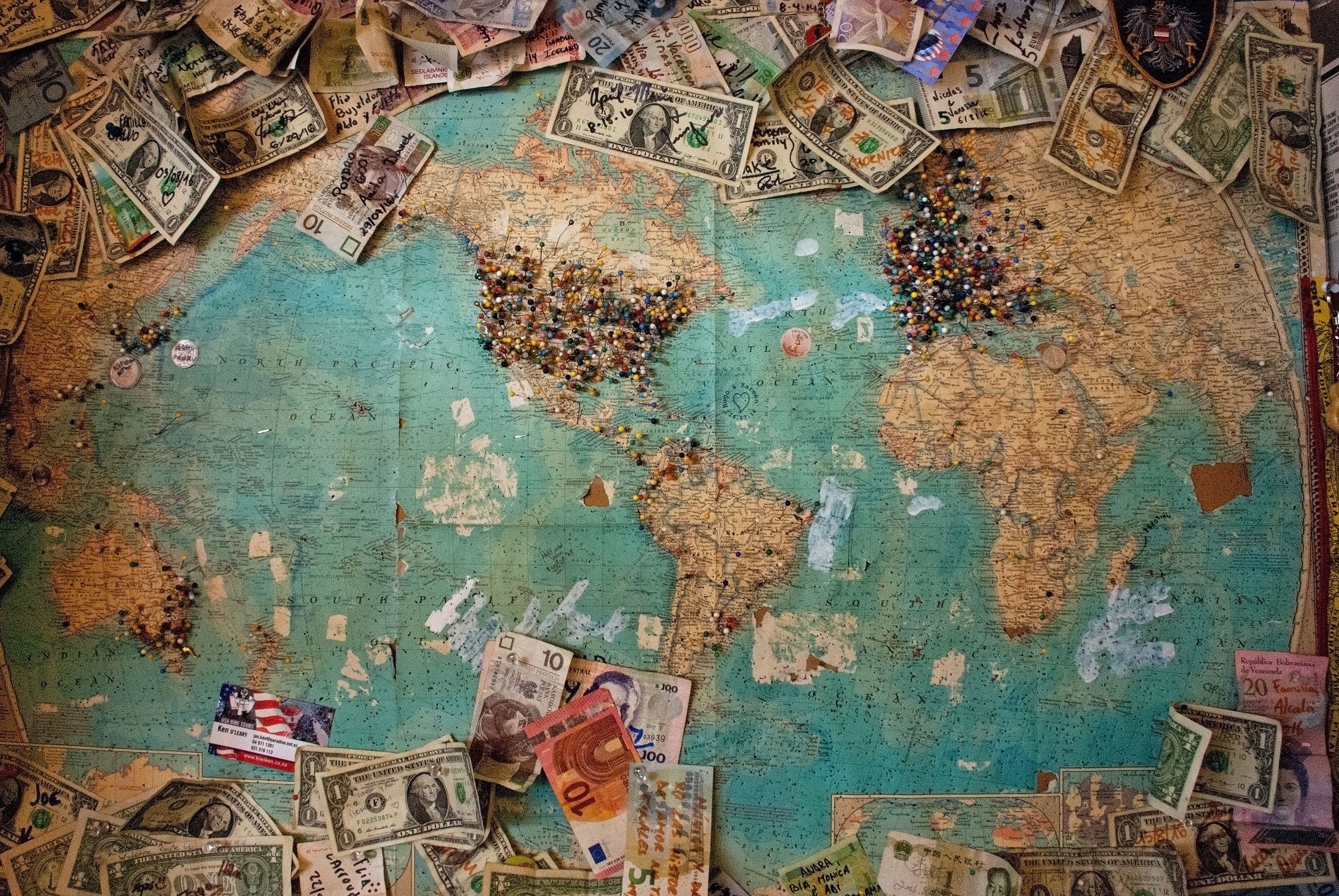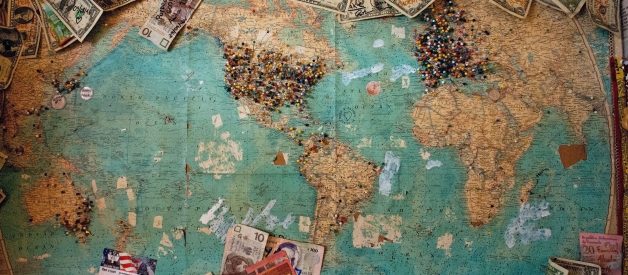Neoliberalism is often hard to define, and some even deny it exists. But now the doctrine may be coming to an end, it?s vital we understand what exactly neoliberalism is.
 Photo by Christine Roy on Unsplash
Photo by Christine Roy on Unsplash
Neoliberalism is a word that lingers in the background of all economic discussion. It is a word that pierces the zeitgeist like no other, a word rivalled only by postmodernism in its simultaneous vastness and vapidity. A word, in short, we have all seen but never gazed upon, as if observing a shadow.
One might be forgiven for thinking this is all quite dramatic language to describe what is at its core an economic school of thought. To an extent this is true, in both senses: neoliberalism is a school of thought, and this is dramatic language. But neoliberalism has become so much more, especially following the financial crisis and the rise of populism. Neoliberalism now exists, in an appropriate tentacular style, within many domains, penetrating many minds and embodying many ideas.
The effect this slippery ubiquity has is to disguise neoliberalism, so much so that it vanishes. The philosopher Mark Fisher had a phrase for this phenomenon: capitalist realism. Capitalist realism describes the belief that there is no alternative to capitalism. Neoliberalism is the parent of capitalist realism, while the latter hides the former: if there is no alternative, why should we bother looking for one?
Neoliberalism?s invisibility, then, comes from a desire not to look, rather than an inability to see. This is an element of the doctrine that sits outside of economics but has become an inseparable quality of neoliberalism in practice. The semi-popular claim that neoliberalism doesn?t exist is one that anyone who attempts to sincerely engage with the topic soon comes across. Such a claim, I believe, comes from a place of ignorance. Firstly, ignorance that is born from a place of capitalist realist incuriosity. Secondly, and as a result of the first, the honest ignorance of the components of neoliberalism that render it different from classical liberalism.
I cannot enlighten someone who refuses to see beyond capitalist realism, though by giving a name to the condition we might nudge them into a more critical mindset. I can, however, discuss neoliberalism as an economic idea, and in doing so highlight the features of our current political economy that are derived from neoliberalism. This, too, has the effect of dispelling capitalist realism: if we can identify the economic choices our representatives are making, and recognise them as choices, those choices are placed under greater scrutiny, and a more equitable politics is (hopefully) achieved.
What?s New About Neoliberalism?
Neoliberalism could also be called new liberalism; a reinvention of what is now called classical liberalism. This genetic history is one of the central pillars surrounding the actuality of the term neoliberalism, with many arguing neoliberalism is essentially the same as classical liberalism. Some might even go further, arguing that the doctrine which replaced classical liberalism ? Keynesian ? was just a temporary regime necessary to deal with political externalities (fascism, communism, WW2), and so the regime that replaced Keynesianism ? neoliberalism ? was just a realigning of naturalistic economic logic. In this sense, the new in neoliberal is like the new in a movie franchise: the sequel is new, but not necessarily different.
But this is wrong. It is wrong in its justification of Keynesian as a response to externalities because this implies there was nothing wrong with classical liberalism. This, of course, isn?t the case: following the Wall Street Crash of 1929, economies the world over struggled for the best part of a decade to recover, with only proto-Keynesian policies like the New Deal (and proto-planned economy measures instituted during the war) generating enough demand to end the slump. A slump, we should remember, caused by the laissze faire economic doctrine of classical liberalism.
We should also remember that thought does not happen in a vacuum and is influenced by the ideas and challenges of the time. The architects of neoliberalism ? the Mont Pelerin Society ? established themselves against Keynesian but would nevertheless have to establish their ideas within Keynesian institutions and systems. This is not to say neoliberalism is a form of Keynesianism, only that neoliberalism was conceived at a time of Keynesianism, and to assume that these conditions were not reflected in the former?s synthesis seems foolish.
To understand this argument, let?s answer the question: what is new about neoliberalism? Classical liberalism believes in free market capitalism, with the state?s role being protection of rights which facilitate free markets. For example, classical liberalism is very much approving of the state enforcing property rights, because private property ownership is key to free markets. Neoliberalism extends the role of the state. Under neoliberalism, the state?s role is not just to protect rights which facilitate free markets, but also to create markets and support markets. For example, under classical liberalism, the 2008 financial crisis should have resulted in the collapse of many of the world?s banks because that was the will of the market. Under neoliberalism, this crisis threatened the existence of the market, and so it was within the remit of the state to support the market.
Note, support does not mean become, nor does it mean consume. Under neoliberalism, markets are still king, and the state is not justified in throwing its weight around within it (as a supplier; demand is a different story). If they did, this would crowd out the market, something which neoliberalism argues undermines markets and does not allow them to do their magic. Under neoliberalism, institutions such as central banks, government treasury departments and supranational financial institutions ? credit creators ? are vitally important. Here?s where we see the Keynesian connection.
Keynes? argument was essentially one of confidence: in a crisis, people lose confidence ? what Keynes called animal spirits. He argued that under such conditions, market equilibrium could be achieved while maintaining involuntary unemployment. Because of the lack of confidence, capital isn?t willing to take risks because they don?t believe the demand exists for their products. Thus, workers who would be employed are left unemployed. For Keynes, the solution was for governments to generate demand ? as it was once put, digging holes in the ground and filling them up again ? in order to restore confidence and eliminate involuntary unemployment.
This sort of intervention (indeed, this whole way of thinking) didn?t exist under classical liberalism, which is why the doctrine couldn?t solve the Great Depression. Under neoliberalism, however, the state still can (kind of) do this. Rather than the government generating demand for labour (directly or indirectly), governments under neoliberalism can provide cheap credit to companies in the form of tax cuts, quantitative easing and share purchases (all of which were done during the financial crisis). In fact, share purchases is a fantastic example of neoliberal doctrine in action. During the financial crisis in 2008, the British bank RBS required a massive bailout from the UK government. This involved the UK government becoming the majority shareholder in RBS. However, these shares were all preference or B shares; shares that carried no voting rights. Even in nationalisation, the state cannot intervene in markets.
Cheap credit and various other, ?too big to fail,? mechanisms recognise the problem Keynesian tried to solve but circumvents the mechanisms: if credit is cheap and the company guaranteed by the state, business risk fails to zero and the animal spirits return. Whether this works, however, is another matter?
So yes, there is a difference between classical liberalism and neoliberalism: in brief, classical liberalism demands the state only protect rights that facilitate free markets, while neoliberalism also requires the state to create and support markets.
How Neoliberalism Bought Everything
We?ve discussed how neoliberal governments support markets, now let?s consider how they create markets. I believe this is an important discussion to be had because it explains the distinct and pervasive political strain of neoliberalism, a strain whose symptoms ? Mark Fisher would suggest ? are capitalist realism, hauntology and mental health crises. As above, capitalist realism is a facet of the doctrine, and explains the denialism of neoliberalism which is equally a facet of neoliberalism.
Anyone who has had the pleasure of working in the financial sector will have heard the term, ?market maker,? and the phrase, ?bring it to market,? These phrases broadly mean the same thing: make something available for purchase. This could be releasing a new product (i.e. Apple is bringing a new iPhone to market) or selling shares in a company (i.e. I will make you a market in these shares). This is the role governments take in the first stage of neoliberalism.
We can see this in the two most famous policy aspects of neoliberalism: mass privatisation of public services, and massive deregulation and liberalisation of sectors. The selling of rail licenses, for example, is making a market. So too is deregulating, say, the financial industry so that they can be more, ?innovative,? and bring new goods and services to market. A contemporary example is the government?s selling of the 5G spectrum. I?m hesitant to get into whether privatisation is good or not (though, given most governments control natural monopoly assets ? something which the father of neoliberalism and Austrian school economist Friedrich von Hayek may have actually agreed with ? a blind adherence in the, ?market knows best,? approach isn?t wise); I bring these examples up to illustrate the most basic way in which neoliberal governments create markets.
There is, however, a second and subtler way governments create markets under neoliberalism. Consider, once more, the sale of 5G spectrum rights. The government could have chosen not to sell the rights off, and instead invested in the technology themselves, developing a new, publicly owned service in 5G. In fact, the government could legislate for pretty much anything, yet there is this adherence to sale and float. Sale, obviously, involves the sale of assets and rights. Float, on the other hand, is more akin to deregulation. Say the government needs to build 10,000 new homes. They could build them themselves, hiring the workers and buying the materials (which, in a slump, would be a very Keynesian policy). In neoliberalism, however, they float, creating contracts and inviting private investors to build the homes which the government will subsidise (this is neoliberal demand stimulus). This creates markets, clearly, but it also does something very interesting: it transfers political power and decision making to the market.
This, more than anything, explains the rise of populism and the psychosis of neoliberalism. First, the psychosis, which debases the democratic influence we all have, replacing it with the hierarchical corporate authority which only a few have. Prior to neoliberalism, unionisation was a means of expressing one?s power within a private enterprise, while voting was a means of expressing that same power at a national and macroeconomic level. With the collapse of both institutions, the mantra of neoliberalism ? there is no alternative ? becomes hard to refute, as the means of wielding power over the new institutions of deified markets and supranational corporations no longer exist. Second, populism, which within the environment lends credibility to fringe and potentially dangerous ideas simply because they are different to the prevailing ideology. People long for escape, and long for belief; take back control, make America great again ? these are of course stooped in reactionary, nostalgic sentiment, but they are also fundamentally about power and hierarchy, about returning us to a place where the destination wasn?t pre-determined and our decision to travel was ours to make. To return us to a world where neoliberalism doesn?t own everything.
How the Rest Have Won
One might be forgiven for feeling such a critique has moved beyond the scope of this article; an article with a strict goal of defining and describing the features of neoliberalism. But it would be a gross oversight to put forth such as discussion yet omit a part of neoliberalism which is just as fundamental to the doctrine as any other: the flaws in the ideology which are challenging its hegemony, what economist Mark Blyth has referred to ask the bugs in the software.
Classical liberalism?s failure during the Great Depression was that governments of the day had no tools with which to fix the economy, deferring to previous strategies of simply waiting for the memory of crisis to evaporate and animal spirits to return. But this logic is the idea that inspired Keynes? most famous quote:
?[T]his long run is a misleading guide to current affairs. In the long run we are all dead. Economists set themselves too easy, too useless a task if in tempestuous seasons they can only tell us that when the storm is past the ocean is flat again.?
Such was the solution given by classical liberalism, and the problem Keynes sought to tackle. As above, neoliberalism has learnt from Keynes? temporal observation, but from the outset fails to grasp Keynes? sentiment. In his book on Keynes, the economist Geoff Mann notes that Keynes followed a long line of thinkers concerned with saving civilisation, and thus believed any market intervention must not focus on saving capitalism, but saving the people within society whom capitalism serves and is served. Neoliberalism, on the other hand, intervenes to save markets, almost pathological assuming this ensures civilisation.
Thus reveals the spiral of neoliberal intervention. Firstly, the government creates markets through deregulation and transfers of power and assets to private enterprise. Secondly, this buoys the market, until the market collapses as seen under classical liberalism. Thirdly, the government then moves in to support the market through guarantees and cheap credit which transfer market risk to the state without transferring back returns or power (the famous privatise the gains, socialise the loses approach). Fourthly, owners within markets continue to benefit from (potentially reckless) practices and government support while wealth extraction and the devastation of the previous crisis (Keynes? ?current affairs?) harm the masses who see no support. These conditions produce the next crisis, repeating the cycle, though each time the crisis is exacerbated by greater leverage (debt), the tool used to support the market during the previous crisis.
In such a cycle, and where the only popular expression of power is at the ballot box, it is easy to see why a politician that promises to break the cycle, either by not supporting the market any further, or by demanding fair compensation for such support, can gain popularity. This does not explain all populism we observe, however ? these arguments are largely left-wing economic arguments. Right-wing ones may adopt a similar tone, for example, ?there is something wrong, we all know it, and I?m going to fix it,? but they wilfully or accidently misidentify what is wrong. Once more, they may argue, the fragility is not the result of market mechanisms per se, but of actors within the market. This is the followed by the right-wing populist identifying in broad strokes who these bad actors are (elites, immigrants, degenerates ? choose your poison) and sets about on a campaign to, ?remove,? them.
This tendency towards the delegitimisation of government and the socialisation of economic burdens is hardwired into neoliberalism, because to avoid these things would require government violating its role to create and support ascribed to it by neoliberalism. In a Hegelian sense, this is a dialectical contradiction: neoliberalism brings about the conditions for its own destruction, and in saving neoliberalism, neoliberalism must first be abandoned. Of course, as Keynes would remind us, it is not neoliberalism we are seeking to save, by civilisation.
What Comes Next
It may be tempting to draw parallels to our present populist politics and that of the politics which followed classical liberalism?s demise. I think this is a mistake. Just as neoliberalism is not simply classical liberalism rebranded, today?s populism is not just the populism of old made anew. Neither will the economics that follows neoliberalism just be reheated Keynesian. Whatever comes next will be shaped by neoliberalism, just as neoliberalism was shaped by the Keynesian economics it sought to replace.
Thus, we might hypothesis something called neo-Keynesian, of which a powerful candidate may be modern monetary theory, or MMT. Yet, neoliberalism also appropriated the benefits of Keynesian to solve the problem that had brought down its predecessor, classical liberalism. As such, a doctrine such as MMT, one that says little about controlling inflation and preventing stagflation, doesn?t mimic neoliberalism?s approach.
Perhaps, then, the next big economic idea may attack the idea of markets, focusing much more on ownership and democratic control than on price stability, inflation or civil obedience. Democratic socialism, which incorporates elements of Keynesian and MMT but situates itself very much in left-wing thought, may thus be a contender. But once more, an extensive program of democratic socialism has yet to be developed, and insofar as the pathology of capitalist realism remains entrenched, such a departure might struggle.
To an extent though, I?m not sure the question of what comes next matters as much as the ideas I have hopefully conveyed in this essay. It is not enough to accept neoliberalism may be over; if we are to build a successor that is successful, we must study the predecessor to understand what went wrong. But neoliberalism is only one of two doctrines (the other being Keynesian) that has been actively constructed and implemented within economics. Understanding neoliberalism?s creation and implementation will also convey advantages to whatever comes next. Finally, as with the promise of neoliberalism and the great moderation, neoliberalism conveys to its successor another value gift: whatever comes next will have its own advantages, and its own contradictions, and we should be wary but curious of both.


